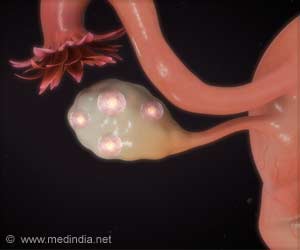
‘Kinases are key enzymes which control a number of cell functions, such as their growth or their self-destruction.’
Tweet it Now
Targeted therapy has revolutionized the treatment of certain types of cancer. An important class of drugs are kinase inhibitors, which are particularly successful in treating certain types of blood and lung cancer. Kinases are key enzymes which control a number of cell functions, such as their growth or their self-destruction. About 500 different kinases are encoded in the human genome. In cancer cells, these enzymes are often overactive and the normal regulation mechanisms cease to function. Abnormal cells can multiply uncontrollably and the growing tumor initiates the formation of blood vessels in order to sustain itself. The use of kinase inhibitors can successfully slow tumor growth in certain types of cancer. More than 350 kinase inhibitors are currently in clinical trials, 37 of which have already been approved for therapeutic use. "In many cases, the precise mode of action of the individual inhibitors is not known," explains Bernhard Küster, the lead researcher on the project, who holds the Chair of Proteomics and Bioanalytics at the Technical University of Munich. "Many inhibitors have different functional targets in cancer cells and therefore could have a much broader spectrum of application than previously thought."
The international team of scientists, physicians, and computer scientists took a unique approach in order to elucidate which kinases and cellular signaling pathways are specifically targeted by the inhibitors: In over more than 6,000 hours of mass spectrometry, the researchers analyzed the interaction of 243 clinically tested inhibitors with hundreds of kinases. The activity of the inhibitors was examined under near physiological conditions. Instead of testing them using genetically produced enzymes, the scientists analyzed the entire cell content of leukemia, brain tumor, and colon cancer cells in response to the inhibitors. "In that way, we are much closer to the tumor biology and can systematically map out the spectrum of molecular binding partners."
In this "map" of the entirety of human kinases and their inhibitors, the scientists discovered new target structures which had previously not been linked to the drugs. Among them was the kinase MELK, which has been identified as a biomarker for poor prognosis in certain types of lung cancer. "Surprisingly, some of the tested inhibitors are capable of blocking MELK activity," explains Bernhard Küster. The research team also identified the precise molecular structure of several MELK-inhibitor complexes, forming the basis for the development of optimized MELK inhibitors.
The researchers discovered a new use for the kinase inhibitor cabozantinib, which is currently used to treat thyroid cancer. The results showed that cabozantinib is also effective against a kinase which plays a role in the onset of acute myeloid leukemia (AML). The drug was able to drastically slow the growth of leukemia cells in mice. "Since the agent is already an approved drug, we can take it straight to a new clinical trial," said Bernhard Küster.
Advertisement
Advertisement














